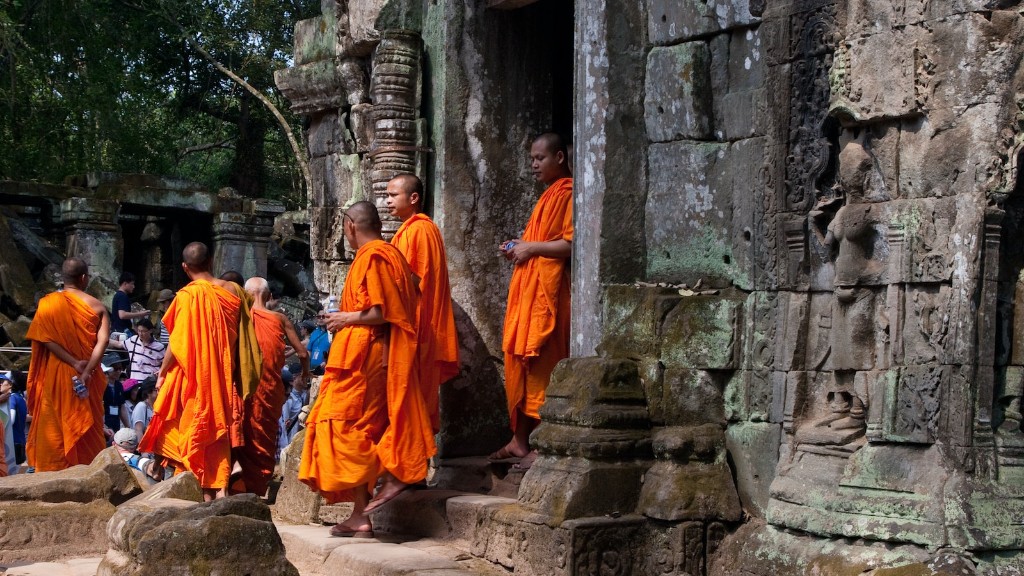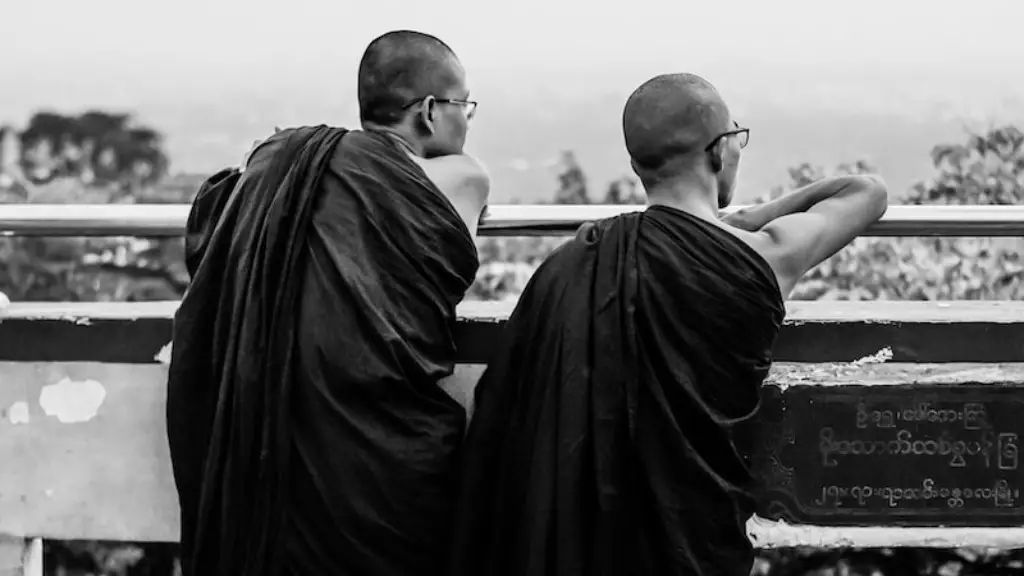What Is One Major Idea Hinduism Teaches To Its Followers?
Hinduism, one of the oldest religions in the world, is a collection of spiritual beliefs and traditions based on ancient scriptures. It promises spiritual guidance to achieve Moksha, or liberation from the cycle of birth, death, and rebirth. It also teaches followers to become enlightened and attain oneness with the universe. Hinduism is rooted in the concept of dharma, which is based on the idea that everyone has a purpose in life and is ultimately responsible for their actions. The central belief of Hinduism is that God, or Brahma, is in everything and is experienced through contemplation, meditation, and worship.
One major idea that Hinduism teaches its followers is that of karma. Karma is believed to be universal law governing cause and effect. It states that any actions taken by an individual have future effects, which manifest themselves in the form of either reward or punishment. People are obligated to act with integrity and follow ethical codes as part of their spiritual growth and to guarantee positive outcomes in their future lives. Karma holds a critical role in Hinduism as it determines an individual’s destiny and ultimate fate.
Hinduism also teaches its followers the concept of reincarnation. Reincarnation, or Samsara, is the belief that when a person dies they are reborn in a new form or body. This process, known as transmigration, is seen as an opportunity for spiritual growth and the pursuit of Moksha. It is believed that one’s previous lives will determine their future lives and the only way to end the cycle of reincarnation is to achieve Moksha. This is why Hindus devote themselves to meditation and prayer, as these are seen as paths to salvation.
Hinduism also places a strong emphasis on the importance of personal and social responsibility. Hindus are taught to accept the consequences of their actions and strive to be socially conscious and morally sound. Hindus believe that individuals have an obligation to contribute to society. This may be in the form of offering service to others, helping those in need, and setting a positive example for others. This code of personal and social responsibility is based in the idea that individual actions have a direct and indirect impact on society.
Hinduism also encourages followers to pursue knowledge and learning as a path towards spiritual evolution. Hindus are urged to seek knowledge through learning and education, as this is seen as the path to wisdom. This includes learning about the world around them, the natural universe, and the concepts of divinity, holiness, and faith. In addition, Hindus view knowledge as an opportunity to develop personally, which leads to spiritual growth and wisdom.
Finally, Hinduism teaches its followers to practice Ahimsa, or non-violence, towards all living things. It views every living creature as a manifestation of god and should be treated with respect and compassion. Hindus believe that violence done to another living being will lead to negative karma and harm the individual spiritually. Therefore, Ahimsa is seen as a fundamental principle of the faith and Hindus strive to practice it in all of their thoughts, words, and actions.
The Concept Of Dharma
Dharma is a concept of balance and justice that lies at the heart of Hinduism. It is believed to be the inner law of human existence that is based on righteousness, morality, and spiritual convictions. It is an inborn quality of an individual’s life that is intended to bring him or her closer to the ultimate goal of Moksha. Dharma is seen as a path of living for Hindus with varying levels of responsibility for individuals, society, and the natural environment. It is also seen as a means of developing spiritual knowledge and wisdom.
The concept of Dharma explains the relationship between humans and the universe. Hindus believe that the universe is a balance of opposites and the laws of Dharma dictate how these opposites interact with each other. Dharma states that individuals have an obligation to act in accordance with their moral and ethical obligations which will in turn bring them closer to their spiritual goals. Hindus strive to make right choices and live a life of honesty and integrity in order to gain positive karma and create positive outcomes in their future lives.
Hindus view human existence as an interconnected part of the universe and believe that Dharma is the key to understanding the laws of the universe. Hindus view Dharma as a means of guiding their thoughts and actions in accordance with spiritual ideals. They also recognize that Dharma is necessary for achieving the ultimate goal of Moksha. All Hindus strive to live a life of Dharma and the concept of Dharma is integral to the practice of Hinduism.
The Practice Of Yoga
Yoga is a physical and spiritual practice that is deeply rooted in Hinduism. It is an ancient practice designed to promote harmony between the body and mind through postures, breathing techniques, and meditation. It is believed to help individuals create a connection between their physical and spiritual selves. By practicing yoga, individuals strive to become aware of their inner self and gain a greater understanding of their external environment.
Hinduism views yoga as a means of connecting oneself to the divine and understanding one’s true nature. Through yoga, Hindus strive to explore their inner world and gain insight into their relationship with the external world. Asana, or postures, are the physical expression of yoga, while Pranayama, or breathing techniques, are used to foster a deeper connection between the body and mind. By mastering these techniques, individuals are able to better understand their place in the world and find greater spiritual fulfillment.
The practice of yoga helps one to understand the concept of Dharma and learn to live in accordance with the Dharma. It is considered to be a path to self-realization and liberation from the cycle of birth and death. Hindus aspire to use yoga to cultivate awareness, self-compassion, and acceptance, all of which are necessary for achieving spiritual growth. In this way, yoga and Hinduism are deeply intertwined and provide followers with the tools to lead a life of equilibrium between body and soul.
The Power Of Mantra
Mantras are sacred phrases or words that are used in Hinduism to invoke the benevolent energy of the universe. Hindus believe that certain sounds have a unique vibration that can manifest in the form of physical, mental, or spiritual transformation. The use of mantras helps individuals direct their energy and focus the power of their intention to manifest the divine. Mantras have been used for centuries as a tool to reach higher states of consciousness and to connect with the power of the divine.
Hindus use mantras to create a positive atmosphere, provide protection, and open themselves to a higher power. By repeating a mantra, Hindus strive to reach a physical and spiritual equilibrium. In addition, mantras can be powerful aids for spiritual growth, as they help individuals to quiet their minds, reduce stress and anxiety, and open themselves up to a higher universe. Mantras are also used to create sacred spaces, which provide the perfect place for meditation and contemplation.
The practice of mantra has been used for generations by Hindus to connect with spiritual power and find peace and harmony. Mantras are believed to provide a direct connection to the divine and when practiced with purpose, can bring powerful transformations to an individual’s life. The power of mantra lies in its ability to invoke the divine and bring spiritual experiences to those who dedicate themselves to its practice.
The Significance Of Rituals
Rituals are an important part of Hinduism, as they serve to connect the individual to the divine. Hindus perform various rituals on a daily basis to deepen their spiritual connection and invoke the power of the universe. These rituals involve offerings to the gods, rituals of gratitude, chanting of mantras, and prayer. In addition, Hindus also perform rituals to mark various milestones such as marriage, the birth of a child, death, and the end of religious festivals.
Hindus view these rituals as an opportunity to find clarity and inner peace by connecting with their innermost self. Through rituals, Hindus strive to attune themselves to the flow of the universe and become aware of their place in the grand scheme of things. It is believed that rituals create an energy field of divine vibrations that open the individual up to higher states of consciousness. In this way, rituals serve to bring spiritual growth and transformation to those who dedicate themselves to the practice.
Rituals are also seen as a powerful tool for developing morality and virtue. Hindus use rituals to invoke the power of dharma and help individuals to live a life in accordance with their ethical and moral principles. It is believed that rituals can help individuals become aware of their own sense of belonging and can lead to a harmonious relationship with the divine and commmunity. Through ritual practice, Hindus strive to create an environment of love, peace, and harmony for all.


